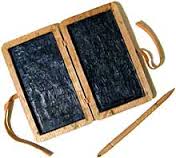Our English Bible is a translation of Hebrew (Old Testament) and Greek (New Testament) originals and it is impossible to completely convey all of the meaning of one language into another. That’s why a computer will never replace a human interpreter.
There is a very funny example of what happens when once scholars tried to use a computer to translate the phrase, “the spirit is willing, but the flesh is weak” from Matthew 26:41. The scholars fed the Greek original into the computer and the computer printed out its translation: “the wine is good, but the meat is lousy.”
Preachers – myself especially – often try to explain the meaning of the original languages. How often have you heard me say, “The Greek word means …”? My grandfather hated it when preachers did that. Papa would shake his head and say, “It could mean peanut butter for all I know.” He felt the minister was just showing off; then he’d add with a twinkle in his eye, “I know a little Greek – he owns a restaurant down on the corner.” Later, when his grandson became a Greek major, he changed his mind and was very proud of me. I miss Papa.
There are some great word pictures in the Greek Bible though and I’d like to share another one with you. The word for today is hypogrammos and is only found in one place in the New Testament:
For to this you have been called, because Christ also suffered for you, leaving you an example, so that you might follow in his steps. – 1 Peter 2:21
Here it is translated “example,” but it literally describes a model or pattern to be copied. In Peter’s day, they didn’t have paper and papyrus was far too expensive to let a child scribble on, so they would fill a small wooden frame with colored wax. The teacher would use a stylus to scribe the alphabet into the wax. Then the student would put his pen in the grooves and trace the letters until his hand remembered their shapes. That line of letters – the perfect example – was called the hypogrammos, the “above writing.” Then the student would try to write the sentence on his own on the line beneath.
Jesus is our example. We practice following in his footsteps and then launch out into our lives looking at the line above ours asking, “What would Jesus do?” Are we following the perfect pattern?
By the way Papa, the Greek word for “peanut butter” is fystikovoútyro, but I promise I won’t use it in a sermon!

